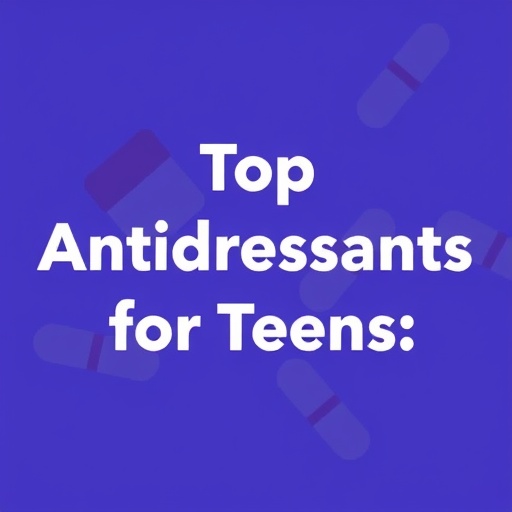A groundbreaking comprehensive analysis published in BMC Psychiatry has shed new light on the comparative effectiveness of various antidepressant medications in treating adolescent depression. Undertaken by Wu, Song, Cao, and colleagues, this extensive network meta-analysis and systematic review meticulously evaluated randomized controlled trials encompassing over twelve thousand young patients aged between 6 and 18. Their findings promise to refine clinical strategies and optimize therapeutic outcomes for a demographic uniquely vulnerable to depressive disorders.
The global prevalence of adolescent depression continues to surge, posing significant challenges for mental health professionals. Adolescents often experience greater sensitivity to medication side effects and require treatments that balance efficacy with tolerability. Addressing this complexity, the research team harnessed data from fifteen rigorous randomized controlled trials to compare a spectrum of antidepressants, including fluoxetine, sertraline, paroxetine, agomelatine, vilazodone, escitalopram, and venlafaxine, among others.
Methodologically, the study employed a network meta-analytic approach—a cutting-edge statistical technique that allows for indirect comparisons between multiple treatments when head-to-head clinical trials are sparse. This innovative design enhances the comprehensiveness and precision of the efficacy estimates. Participants included were clinically diagnosed using standardized criteria such as the DSM-5, DSM-IV, CCMD-3, and ICD-10/11, ensuring consistency and validity across the included studies.
The analytic framework leveraged key clinical scales to measure treatment response. The Children’s Depression Rating Scale-Revised (CDRS-R), Montgomery-Asberg Depression Rating Scale (MADRS), Clinical Global Impression scales (CGI-S and CGI-I), and Children’s Global Assessment Scale (CGAS) collectively provided multi-dimensional insight into symptom severity, clinical improvement, and functional status. These instruments are internationally recognized and widely employed in psychiatric research, lending robustness to the conclusions drawn.
Results revealed nuanced differences in how efficacious each antidepressant was across different dimensions of adolescent depression. Agomelatine, for instance, emerged as a top performer in improving symptom severity as measured by the CDRS-R, with a mean difference suggesting meaningful clinical benefit in comparison to placebo. Paroxetine demonstrated outstanding efficacy on the MADRS, highlighting its potential as a strong candidate for symptom reduction in more severe cases.
Meanwhile, escitalopram distinguished itself in facilitating functional recovery as assessed by the CGAS, indicating its value in helping adolescents regain daily life competencies and social engagement. Sertraline commanded a leading position based on clinician-rated severity and improvement scores, underscoring its capacity to produce rapid and observable reductions in depressive symptoms. Notably, sertraline reached a Surface Under the Cumulative Ranking Curve (SUCRA) score of 100% in the CGI-S scale, suggesting unrivaled performance in this domain.
The SUCRA metric, deployed extensively in this analysis, quantifies the likelihood that a given drug is the best among those assessed. This probabilistic ranking framework provides clinicians with an intuitive tool for guiding prescription choices, especially when balancing multiple therapeutic endpoints such as symptom remission and functional status restoration.
Crucially, the review also scrutinized risk of bias across the included trials, applying the Cochrane risk-of-bias tool. The majority demonstrated low risk regarding randomization and allocation concealment, although some ambiguity remained around blinding procedures. This transparent assessment of methodological quality enhances confidence in the validity and generalizability of the results.
Beyond efficacy, the tolerability and safety profile of these medications in adolescents warrant attention. While the current meta-analysis primarily focused on therapeutic outcomes, the authors emphasize the imperative of tailoring antidepressant use to individual patient needs, considering the delicate neurodevelopmental trajectories characteristic of this age group.
The implications for clinical practice are profound. The authors advocate prioritizing escitalopram when the goal centers on restoring functional capacity, whereas sertraline may be preferred for cases necessitating swift symptom alleviation. The demonstrated efficacy of agomelatine and paroxetine further expands treatment options, potentially benefiting adolescents who exhibit suboptimal responses to first-line agents.
This analysis comes at a pivotal moment as the mental health field grapples with rising depression rates amidst global stressors impacting youth populations. By distilling vast and complex data into actionable insights, this research stands to shape prescribing patterns and enhance patient outcomes substantially.
Moreover, the trial is registered under PROSPERO (CRD42024609880), reflecting the authors’ commitment to transparency and methodological rigor. This registration assures adherence to a predefined protocol, mitigating selective reporting biases and reinforcing the integrity of the conclusions.
Ultimately, this comprehensive network meta-analysis serves as a critical guidepost for psychiatrists, pediatricians, and mental health practitioners navigating the intricate landscape of adolescent depression treatment. It reinforces the necessity of individualized care strategies while supplying an evidence-based hierarchy of antidepressant efficacy tailored to diverse clinical objectives.
As further studies emerge, particularly those evaluating long-term outcomes, safety, and real-world effectiveness, this work will remain a foundational reference. It underscores the power of systematic synthesis and advanced statistical modeling in transforming clinical evidence into tangible benefits for some of the most vulnerable members of society.
Subject of Research: Comparative efficacy of antidepressant medications in adolescent depression.
Article Title: Comparative efficacy of antidepressant medication for adolescent depression: a network meta-analysis and systematic review
Article References:
Wu, T., Song, F., Cao, W. et al. Comparative efficacy of antidepressant medication for adolescent depression: a network meta-analysis and systematic review. BMC Psychiatry 25, 471 (2025). https://doi.org/10.1186/s12888-025-06941-x
Image Credits: AI Generated




